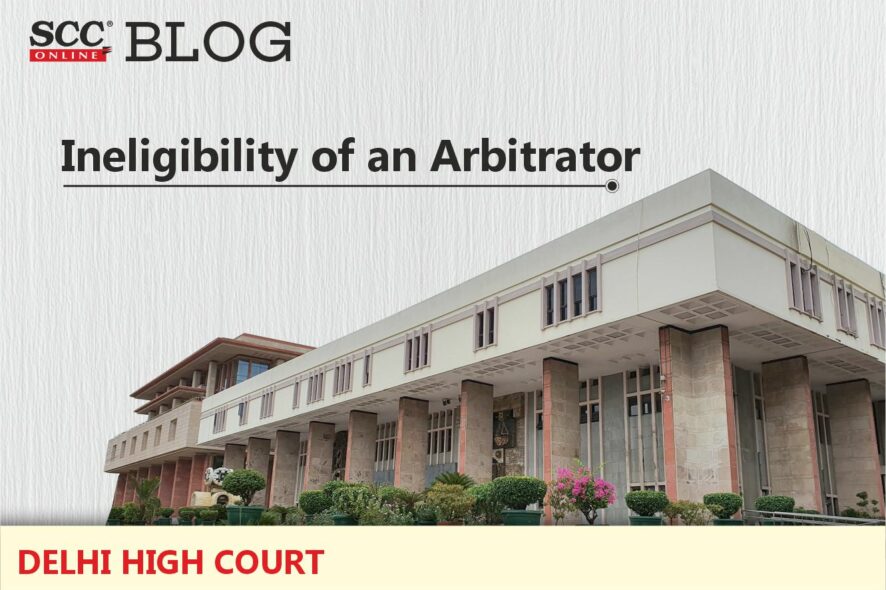Delhi High Court: While addressing the ineligibility of an arbitrator to be appointed, Vibhu Bhakru, J., elaborated on the expression ‘close family member’ and the likelihood of bias.
In the present matter, the petitioner had filed a petition under Sections 14(2) and 15 of the Arbitration and Conciliation Act, 1996, inter alia, praying that the mandate of the Sole Arbitrator be terminated, and an independent arbitrator be appointed in his place.
The claim of the petitioner was that the Arbitrator was ineligible to act as an arbitrator by virtue of Section 12(5) of the A&C Act and he was related to the parties, and they have not entered into any agreement waiving their right to waive the ineligibility, in terms of the proviso to Section 12(5) of the A&C Act.
Law
“It is well settled that Sections 12 and 13 of the A&C Act provide for the mechanism regarding challenge to the appointment of an arbitrator. A party challenging the appointment of an arbitrator would necessarily have to confine itself to that scheme.”
In the Delhi High Court decision of HRD Corpn. (Marcus Oil and Chemical Division) v. Gail (India) Ltd., 2017 SCC OnLine Del 8034, it was held that a person, who is ineligible to be appointed as an arbitrator, would ipso jure not have the mandate to perform such functions. He would lack the inherent jurisdiction to act as an arbitrator. In such a case, it was not necessary for the party challenging the appointment to follow the procedure under Section 13 of the A&C Act; it was open to seek recourse to Section 14 of the A&C Act.
Analysis and Decision
In the petitioner’s application before the arbitrator, it was unequivocally stated that he had not cast any aspersion on the integrity or the character of the arbitrator. The recusal of the petitioner was sought solely on the ground that he was ineligible to act as an arbitrator and to ensure that neither party, at a future stage, could raise a challenge on the said ground.
Question for Consideration
Whether the arbitrator under Section 12(5) of the A&C Act and if so, whether the petitioner has waived his right to object to such ineligibility?
Entries nos. 1 to 9 of the Seventh Schedule of the A&C Act relates to an arbitrator’s relations with the parties or the counsel. Entry No. 9 – which is central to the controversy in this petition – reads as under:
“THE SEVENTH SCHEDULE Arbitrator’s relationship with the parties or counsel
*** *** ***
-
The arbitrator has a close family relationship with one of the parties and in the case of companies with the persons in the management and controlling the company.”
It was noted from the above that, it is not sufficient that the arbitrator is related to any one of the parties; the relationship must be a ‘family relationship’ and, that too, a close one. If an arbitrator has a close family relationship with one of the parties, it is likely to raise a doubt as to his independence and impartiality.
Further, the High Court expressed that, where there is a likelihood of bias, such as where a family member of an arbitrator has a significant financial interest, the same is applicable only if the family member is a “spouse, sibling, child, parent or life partner”.
The above indicated that, the relationship between the arbitrator and the parties can be described as a close family relationship solely on the basis that the arbitrator’s son is married to their niece.
Bench stated that, the plain language of Entry no. 9 indicates that it is not the legislative intent to render a distant relative of the parties to be ineligible for being appointed as an arbitrator if both the parties so agree.
Hence, in the present case, the family relationship between the arbitrator and the parties cannot be described as a close family relationship.
“Close family relationship of A with B and B with C does not necessarily mean that A and C have a close family relationship. This is clear if one considers that first cousins from the maternal side and first cousins from the paternal side can hardly be considered to have any family relationship.”
Lastly, it was noted that the respondent insisted on continuing with the arbitration before the Arbitrator, notwithstanding that neither Sudhir Singhal nor the Company was parties to the proceedings.
High Court found that the petition was unmerited and was accordingly dismissed. [Himanshu Shekhar v. Prabhat Shekhar, 2022 SCC OnLine Del 1651, decided on 31-5-2022]
Advocates before the Court:
For the Petitioner: Mr P. Nagesh, Senior Advocate with Mr Rajeev Ahuja and Mr Akshay Sharma, Advocates.
For the Respondent: Mr Sandeep Sethi, Senior Advocate with Mr Ravi Prakash and Mr Atif Samim, Advocates.







